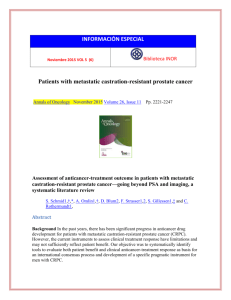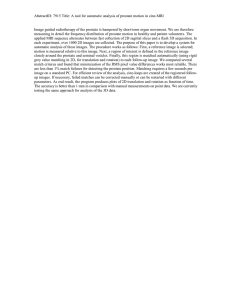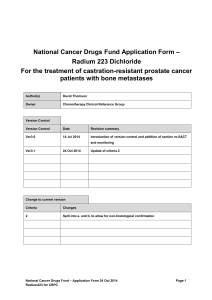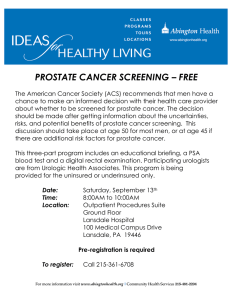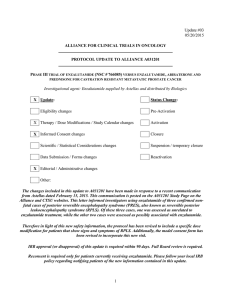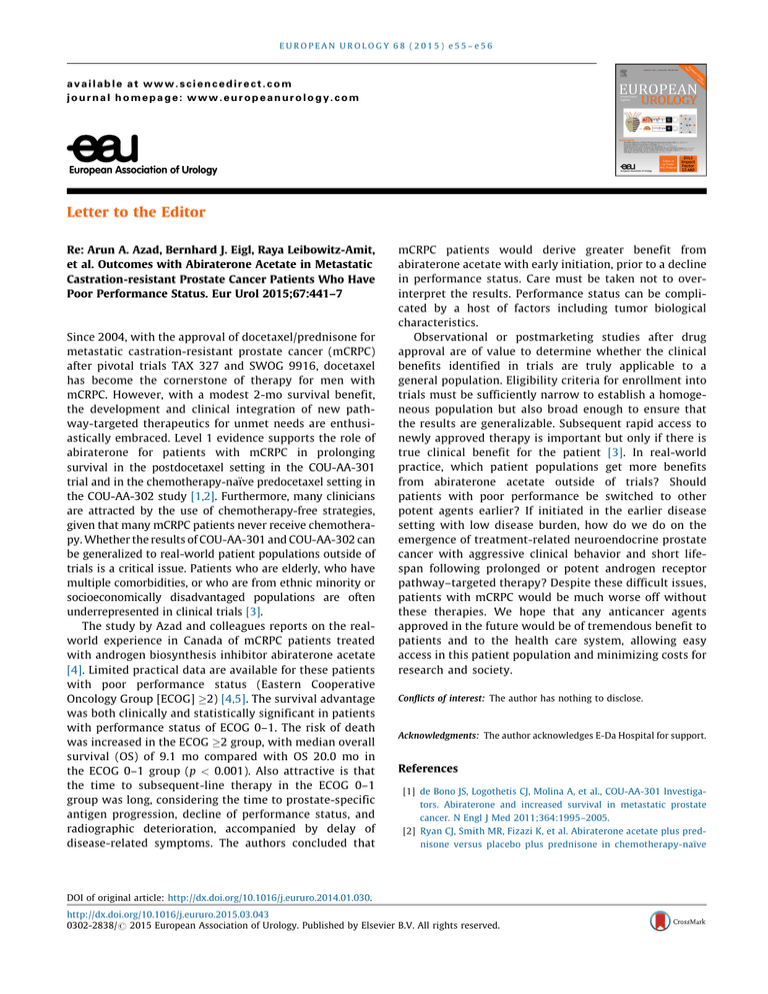
EUROPEAN UROLOGY 68 (2015) e55–e56
available at www.sciencedirect.com
journal homepage: www.europeanurology.com
Letter to the Editor
Re: Arun A. Azad, Bernhard J. Eigl, Raya Leibowitz-Amit,
et al. Outcomes with Abiraterone Acetate in Metastatic
Castration-resistant Prostate Cancer Patients Who Have
Poor Performance Status. Eur Urol 2015;67:441–7
Since 2004, with the approval of docetaxel/prednisone for
metastatic castration-resistant prostate cancer (mCRPC)
after pivotal trials TAX 327 and SWOG 9916, docetaxel
has become the cornerstone of therapy for men with
mCRPC. However, with a modest 2-mo survival benefit,
the development and clinical integration of new pathway-targeted therapeutics for unmet needs are enthusiastically embraced. Level 1 evidence supports the role of
abiraterone for patients with mCRPC in prolonging
survival in the postdocetaxel setting in the COU-AA-301
trial and in the chemotherapy-naı̈ve predocetaxel setting in
the COU-AA-302 study [1,2]. Furthermore, many clinicians
are attracted by the use of chemotherapy-free strategies,
given that many mCRPC patients never receive chemotherapy. Whether the results of COU-AA-301 and COU-AA-302 can
be generalized to real-world patient populations outside of
trials is a critical issue. Patients who are elderly, who have
multiple comorbidities, or who are from ethnic minority or
socioeconomically disadvantaged populations are often
underrepresented in clinical trials [3].
The study by Azad and colleagues reports on the realworld experience in Canada of mCRPC patients treated
with androgen biosynthesis inhibitor abiraterone acetate
[4]. Limited practical data are available for these patients
with poor performance status (Eastern Cooperative
Oncology Group [ECOG] 2) [4,5]. The survival advantage
was both clinically and statistically significant in patients
with performance status of ECOG 0–1. The risk of death
was increased in the ECOG 2 group, with median overall
survival (OS) of 9.1 mo compared with OS 20.0 mo in
the ECOG 0–1 group (p < 0.001). Also attractive is that
the time to subsequent-line therapy in the ECOG 0–1
group was long, considering the time to prostate-specific
antigen progression, decline of performance status, and
radiographic deterioration, accompanied by delay of
disease-related symptoms. The authors concluded that
mCRPC patients would derive greater benefit from
abiraterone acetate with early initiation, prior to a decline
in performance status. Care must be taken not to overinterpret the results. Performance status can be complicated by a host of factors including tumor biological
characteristics.
Observational or postmarketing studies after drug
approval are of value to determine whether the clinical
benefits identified in trials are truly applicable to a
general population. Eligibility criteria for enrollment into
trials must be sufficiently narrow to establish a homogeneous population but also broad enough to ensure that
the results are generalizable. Subsequent rapid access to
newly approved therapy is important but only if there is
true clinical benefit for the patient [3]. In real-world
practice, which patient populations get more benefits
from abiraterone acetate outside of trials? Should
patients with poor performance be switched to other
potent agents earlier? If initiated in the earlier disease
setting with low disease burden, how do we do on the
emergence of treatment-related neuroendocrine prostate
cancer with aggressive clinical behavior and short lifespan following prolonged or potent androgen receptor
pathway–targeted therapy? Despite these difficult issues,
patients with mCRPC would be much worse off without
these therapies. We hope that any anticancer agents
approved in the future would be of tremendous benefit to
patients and to the health care system, allowing easy
access in this patient population and minimizing costs for
research and society.
Conflicts of interest: The author has nothing to disclose.
Acknowledgments: The author acknowledges E-Da Hospital for support.
References
[1] de Bono JS, Logothetis CJ, Molina A, et al., COU-AA-301 Investigators. Abiraterone and increased survival in metastatic prostate
cancer. N Engl J Med 2011;364:1995–2005.
[2] Ryan CJ, Smith MR, Fizazi K, et al. Abiraterone acetate plus prednisone versus placebo plus prednisone in chemotherapy-naı̈ve
DOI of original article: http://dx.doi.org/10.1016/j.eururo.2014.01.030.
http://dx.doi.org/10.1016/j.eururo.2015.03.043
0302-2838/# 2015 European Association of Urology. Published by Elsevier B.V. All rights reserved.
e56
EUROPEAN UROLOGY 68 (2015) e55–e56
Kevin Lua,b,*
men with metastatic castration-resistant prostate cancer (COU-AA302): final overall survival analysis of a randomised, double-blind,
placebo-controlled phase 3 study. Lancer Oncol 2015;16:152–60.
[3] Wilson MK, Collyar D, Chingos DT, et al. Outcomes and endpoints
in cancer trials: bridging the divide. Lancet Oncol 2015;16:
e43–52.
a
Division of Urology, Department of Surgery, E-Da Hospital,
Kaohsiung City, Taiwan, Republic of China
b
School of Medicine, I-Shou University,
Kaohsiung City, Taiwan, Republic of China
[4] Azad AA, Eigl BJ, Leibowitz-Amit R, et al. Outcomes with abiraterone acetate in metastatic castration-resistant prostate cancer
*4 Fl. Bldg. C, 1, Yi-Da road, Yan-Chao District,
patients who have poor performance status. Eur Urol 2015;67:
82457 Kaohsiung County, Taiwan, Republic of China.
441–7.
[5] Harrison MR, Armstrong AJ. Burden of disease matters when it
Tel. +886 7 6150011 ext. 2975; Fax: +886 7 6150982.
E-mail address: kevinlu0620@mail2000.com.tw.
comes to systemic therapy for prostate cancer. Eur Urol 2015;67:
448–50.
March 27, 2015

